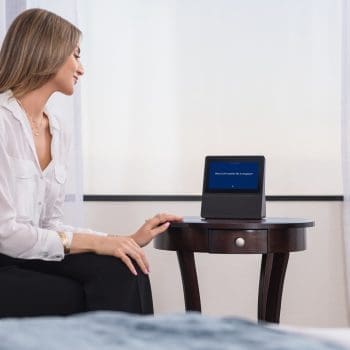 As summer nears and travel moves closer toward recovery, technology continues to play a vital role in keeping hotel guests and employees happy and safe while balancing an increased desire for social distance. Although staffing shortages continue to challenge hoteliers to deliver on guests’ expectations, contactless solutions — such as digital in-room voice assistants — are providing a better, more convenient, and hygienic customer experience. But not all voice solutions are created equal. While most fulfill guests’ requests or provide local recommendations and hotel information, not all ensure data anonymization, communicate with peripheral hardware/software systems, consolidate in-room equipment, facilitate seamless integrations, and enable brand messaging consistency. When it comes to voice technology, details are important.
As summer nears and travel moves closer toward recovery, technology continues to play a vital role in keeping hotel guests and employees happy and safe while balancing an increased desire for social distance. Although staffing shortages continue to challenge hoteliers to deliver on guests’ expectations, contactless solutions — such as digital in-room voice assistants — are providing a better, more convenient, and hygienic customer experience. But not all voice solutions are created equal. While most fulfill guests’ requests or provide local recommendations and hotel information, not all ensure data anonymization, communicate with peripheral hardware/software systems, consolidate in-room equipment, facilitate seamless integrations, and enable brand messaging consistency. When it comes to voice technology, details are important.
When voice assistants first came on the hotel scene, they were intended to enhance the guest experience. Today they are also augmenting stretched staff and driving additional revenue. In addition to working around the clock to fulfill guests’ verbal requests for more towels or answer questions about the local area, digital concierge devices can control the guest’s environment in the room (temperature/lights/curtains/Do-Not-Disturb/TV), schedule on-site services, play personalized music, replace the bedside phone and alarm clock, and even call for help in the case of an emergency.
Choosing the right voice solution to complement a hotel’s technology stack is not a simple task. It requires due diligence to determine which solutions are hotel-specific and which deliver the best service with the highest privacy protections, and with the quickest returns. This mission-critical investment should be built with hospitality in mind and be scalable and multilingual. Data should be owned by the hotel and not a third party, and all information should be wiped from the device as soon as a guest has checked out of the hotel.
Here are four things to consider before selecting a digital voice assistant or virtual concierge for your hotel:
- Privacy, Privacy, Privacy. Thirty-one percent of hotel guests recently said offering a voice-controlled device inside the guestroom – which enables them to communicate with the hotel during their stay – is an important criteria when selecting a hotel. However, 56 percent of those same respondents said they are concerned about possible privacy/security issues associated with using a voice-controlled device. To meet this demand and ensure that guests are comfortable with the total voice experience, hoteliers must ensure privacy safeguards are in place to ensure that guests’ personally identifiable information is not captured or shared with a third party. Before choosing a provider, determine: 1) if security was designed into the product from the beginning; 2) if the solution is purpose-built for the hotel business environment; 3) who owns the data exchanged (the technology company or the property/brand – the latter is preferred); 4) if devices can be reset upon guest checkout (they should be).
- Content Control. Being able to customize content is important. Make sure the digital voice assistant you choose allows the hotel or brand to control the answers to almost any question. For example, if someone asks, “Where is the best steakhouse?” Make sure the first response provided promotes the hotel’s onsite steakhouse vs. a restaurant close by. Avoid solutions that solely leverage consumer search engines to answer guest queries.
- Seamless Integrations. What makes digital assistants so attractive to users is the voice-on-command convenience. Being able to close the curtains, turn down the lights, set the thermostat to a desired temperature, and turn the TV to a specific channel without getting out of bed or touching a germy remote control is a game changer for today’s travelers, but it takes integration. This is especially true for travelers with mobility issues or people with vision challenges who cannot see equipment to control the room environment. Connecting voice devices to the PMS for automated guest check out, f&b ordering, spa bookings, or scheduling tee times, and to workflow systems to fill housekeeping and engineering requests, will have a positive impact on the bottom line and employee retention. Before selecting any voice solution, ask to see the company’s list of integration partners. If the voice system cannot communicate with others, it’s probably not a sound investment.
- Equipment Consolidation. Today’s digital voice assistants are designed to replace a plethora of in-room equipment, including the costly guestroom phone, the bedside alarm clock, music speakers, standalone mobile device charging units, hotel directories (print or digital), and even nightlights. Factor in these devices’ multilingual capabilities, TV remote control and channel guide functionality, and Bluetooth music streaming, and this new technology investment just paid for itself through equipment consolidation. What was once a costly endeavor to maintain and replace multiple devices has now become more manageable. Guests will appreciate the reduced clutter and staff will appreciate having less to clean and maintain.
People are returning — a new study from booking technology platform Arrivia reports that 69 percent of consumers are eager to travel this year. Likewise, hoteliers are eager to invest in voice — 55 percent of hoteliers say they consider voice-enabled devices to be an emerging technology worthy of investment. The hotels with the most market share will be the ones willing to meet guests’ 24-hour, multilingual demands for contactless experiences. Nearly 92 percent of hoteliers said their guests expect contactless options and 75 percent believe that contactless will become a long-term trend, according to the 2022 Hotelier Technology Sentiment Report.
In-room technology – including voice-controlled devices that enable guests to customize their stay experience and exert greater control over their stay – is projected to lead spending this year. Before you buy, it’s wise to do your homework.
About the author
Tammy Estes is Chief Product Officer at Nomadix, a leading provider of patented internet gateways, wired and wireless infrastructure networks, in-room TV casting, Passpoint, Angie in-room voice assistants, and a cloud-based telephony service for hotels.



























